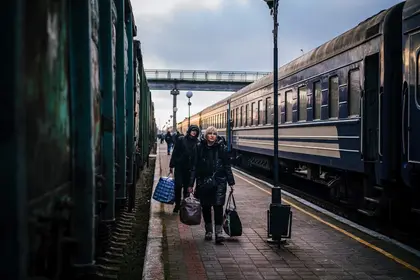According to the United Nations, since the beginning of Russia’s full-scale invasion almost 8 million refugees have fled Ukraine to European countries. Of those 8 million, 86 percent of them are women. It’s well known that the largest number of Ukrainians, more than 1.5 million, are now in Poland. The fact that Germany holds second place with more than one million Ukrainian refugees is not as well known. Kyiv Post talked to three Ukrainian women who have chosen Germany as a place of refuge: Kateryna has decided to go back to Ukraine in the near future, Tina intends on staying in German until the victory, and Tetiana (not her real name) has only recently arrived from near Kyiv.
- View the freshest war in ukraine update in the Kyiv Post’s daily news pieces that came out today.
- Obtain the most recent updates on the Ukraine situation today.
Kateryna S. is 39, a film producer who, before the war, was involved in movies, television projects, and commercials. She left for Germany with her then 12-year-old son on the second day of the Russian invasion, February 26. She chose Germany because her friends and part of her family have lived there for many years. In December 2022, Kateryna came to Kyiv for the first time since the beginning of the invasion.
JOIN US ON TELEGRAM
Follow our coverage of the war on the @Kyivpost_official.
“During the ten months I was in Germany, my son and I changed several places of residence and travelled around the country a bit,” Kateryna says. “But we stayed in Berlin for the longest time, although we moved from apartment to apartment there as well. We are registered in an assistance program – the state compensates us for our rent. We also have enough money for food, so our basic expenses are covered.”

Thinking Out Loud – Where We’re at, What’s at Stake, and What Ronald Would Have Said
In Germany, Kateryna managed to work on several projects: organized an exhibition of Ukrainian artists in Stuttgart, participated in the filming of several commercials, helped her Ukrainian refugee friends from the film industry for free, and started working as a producer in a German animation studio. But emotionally, her life is harder there.
“In Germany, there’s a lot of panic among Ukrainians. Because there’s nothing to lean on, it’s hard to understand what’s happening, and there’s no way to influence the situation. There’s a very strong sense of helplessness and inaction. In Kyiv, though, it’s clear what needs to be done to save one’s own life – this gives the illusion of control over the situation. Yes, Kyiv is darker now, but there’s no anxiety or panic here. On the contrary, the city’s sense of irony has increased.”
Kateryna experienced very different emotions over the course of these 10 months of war. But the main fear was not about nothing to eat or electricity shutdowns. Rather, that Ukraine, as it is, could disappear.
“I was afraid that this society I want to live in might disappear. I’ve always been able to leave Ukraine, but I consciously chose to live here. Because I like it here, I made my contribution, and I think we were coping, we were a single organism. And now, when we’ve been divided into smaller parts – many Ukrainians have gone to Europe – it seems we’re all suffering.”
“That’s why I want to come back. Now I brought my son back because he decided he likes it better in Kyiv – he has his home, his father, and his dog here. He wants to go to a Ukrainian school and socialize with his Ukrainian friends. I’ll finish my business in Germany and return in a month because this is where I see my future. I want to work in my industry with my team. Here, in Ukraine, in Kyiv, it’s more interesting.”
Forty-two-year-old Tina O., her husband and her 4-year-old daughter were caught by the invasion in Bucha. On the very first day, they moved to neighboring Vorzel, where they spent the next two weeks in the basement of a private house with friends. They managed to escape to Kyiv from the area, which soon became one of the worst hit in the war, on March 9, 2022. A few weeks later, Tina and her daughter left for Germany.
“My husband insisted. Because we had to save our daughter. My family said I had to text my friends in Germany, who told me to grab my daughter and cat and go there. They covered all the expenses for the trip.”
At first, Tina and her daughter lived in Berlin – friends helped them find a family willing to take them in. And then they moved to a small town in western Germany, near Cologne.
“It’s a miracle we found such wonderful hosts renting us a part of their private house. The rent is paid by the city administration. I only pay for electricity, but the amount is quite high. There’s enough help from the state, even considering the price increase, and my daughter is growing rapidly and needs clothes and shoes. New local friends and neighbors help a lot with toys. We’re very lucky to have met such people. The owners care for us like their family, and we’re already good friends.
"In my free time, I have a rather symbolic job. I can’t work much because my daughter’s kindergarten is only open until noon, with no possibility of an extension. So from Kyiv, a big company (which has suspended its activities due to the constant power outages) sends me texts and presentations to translate from Russian into Ukrainian and English. It’s a lot of text for a small amount of money.”
Tina plans to return to Ukraine, but now only for a temporary visit to see her family. She still fears a long and difficult journey with many transfers, all with a little child who has been ill for three months.
“I’ll probably return only when the war is over. And not just after our victory is declared, but when the borders are opened for men to leave – for me, this will mean no danger. In my ideal world, I would like my husband to come for us by car. I’m really scared to travel so far alone with my daughter, and I’ve never felt that way before.”
Tetiana K., 41, was a consultant and marketer at the time of the invasion. She lived in a small village near Kyiv. The Russian troops did not reach her village – the Ukrainian army stopped them a few kilometers away. But she could hear the sounds of the war very well. In the summer, she married her boyfriend, who had been mobilized into the Ukrainian Armed Forces from the first day of the Russian invasion. Tetiana left for Germany in January 2023.
“Because there was no electricity at home and no way to work,” she explains. “In our village, the electricity was on for two hours a day, randomly and without any schedules. All work stopped, and I can only work online. And all the talk of a second attack on Kyiv scared me. I read forecasts and headquarters reports that there are no preconditions yet. But the February 2022 events – mostly in Bucha, Irpin and Makariv, which is very close – scared me a little. A drone was shot down right over my house on New Year’s Eve. And another one was shot down over our village later, and more recently a cruise missile. Shrapnel damaged the houses. I think about it all the time.”
“I have friends and relatives in Germany. They advise me to look for a job in my profession – marketing and PR. They say, with my English and experience, even the Germans would be happy to hire me. But I haven’t decided yet. To be honest, I’m not doing anything yet and don’t plan to. I can’t even do my job as planned. It’s either stress or something else. I can’t focus on anything. I have no plans. I’m learning the language, just in case. I help volunteers – I translate for refugees when they communicate with local volunteers and social workers. That’s all for now.”
Tetiana cannot say if she will be back in Ukraine. She will decide when the war is over; then she will consider her situation in Germany and what will be happening in Ukraine. Her husband’s business has gone under, so he has to start from scratch. Not much is clear for her, so her planning horizon is a month, at most.
You can also highlight the text and press Ctrl + Enter






